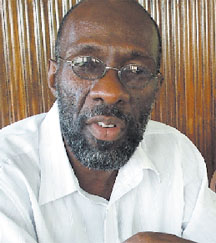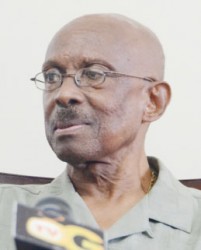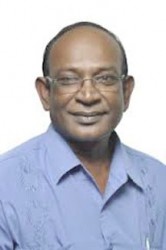Local government ministers, since December of 2008, have held the power to call elections to select persons to the posts of Mayor and Deputy Mayor and their failure to do so is in part responsible for Mayor Hamilton Green’s extended tenure, says UG Registrar Vincent Alexander.
Alexander’s observation comes in the wake of the government’s criticism of Green’s management of the


Georgetown Municipality. He said that the government continues to say how bad a job Green has been doing, but suggested that it is somewhat accountable since it gave itself the power to hold elections through which Green could have been removed.
Alexander currently serves as a Commissioner to the Guyana Elections Commission (Gecom). He also served as Co-Chair on the Joint Task Force on Local Government Re-form.
In December of 2008, the National Assembly voted unanimously to pass the Local Authorities (Elections) (Amendment) Bill, which postponed local government elections until December 1, 2009.
The decision was made to allow some time for key constitutional reforms to take place. Since then, the bill has been laid and passed annually, to allow for the holding of local government elections until the necessary legislation is put in place.
Such a bill was passed again during the last sitting of the National Assembly.
But, the government, using the majority it enjoyed at the time, voted to include an amendment to the bill that makes provision for elections for the post of Mayor and Deputy Mayor within the local municipalities at the request of the Local Government Minister. Kellawan Lall occupied this post at the time.
The amendment reads: “Notwithstanding anything in Section 2 or in any other provision of this Act, the Minister may request of a local democratic organ (or on his instructions) authorize the holding of elections at any time for a Mayor, Deputy Mayor, or a Chairman or a Deputy Chairman of a local democratic organ.”
The parliamentary opposition, at the time headed by Robert Corbin, opposed the amendment, arguing that it gave the minister the ability to dictate decisions to the town councils.
Notwithstanding the opposition’s stance against the amendment, a call for division following the vote showed that government passed the amendment 29-22. Justifying the amendment, Lall argued that the provision would allow local democratic organs to hold elections for a mayor and a deputy mayor after many years, and dismissed the opposition’s claims that the amendment was “sinister”.


The government therefore has held the power to call for elections for the positions of mayor and deputy mayor for some time now, but has not done so. Instead, it has lamented the ineffectiveness of the Georgetown City Council, which they say has grown under Green’s leadership.
Local Government Minister Ganga Persaud did not hold the portfolio in 2008 when the bill was passed, but he has held the position since 2011.
Asked why he has not called for election in the Georgetown Municipality, in the light of his government’s constant criticism of Green, he said he could not recall what piece of legislation was being referred to, and needed to do some research to get familiar with the issue in question.
The government has even tied Green’s “ineffective ability to properly manage the city” to the PCNR, of which he is a member.
Local government elections were last held in 1997, along with general elections. Since then, a series of developments has caused local government elections, which according to the law should be held every three years, to be postponed.
Following turmoil which surfaced following the 1997 elections as a result of dissatisfaction with the electoral process used, an agreement was signed to review and amend Guyana’s constitution.
It was believed that changes to the constitution would quell the disquiet which was spreading rampantly. The Constitution Reform Commission (CRC) was therefore set up, and the body went about receiving proposals from various stakeholders. Eventually, some of these proposals were presented to the National Assembly and voted on.
But after the process of constitutional reform was completed, decisions were taken to hold off on local government elections to facilitate the implementation of the changes to the constitution, and subsequent to that, yet another decision was taken to hold off the elections until local government reform had taken place.









